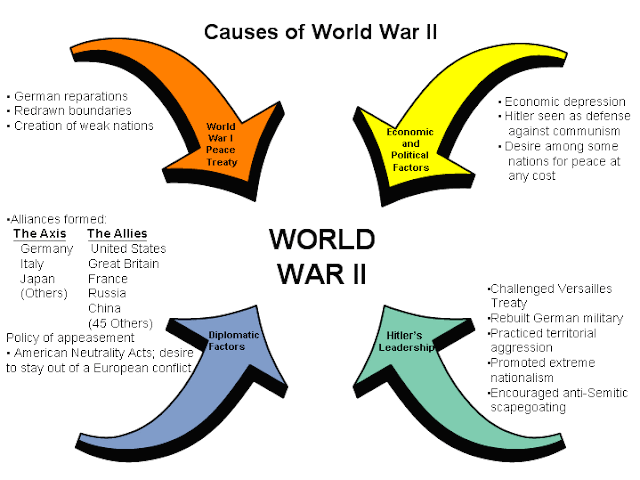World War II

The vast majority of the world's countries—including all the great powers—eventually formed two opposing military alliances: the Allies and the Axis.
A state of total war emerged, directly involving more than 100 million people from over 30 countries.
The major participants threw their entire economic, industrial, and scientific capabilities behind the war effort, blurring the distinction between civilian and military resources.
World War II was the deadliest conflict in human history, marked by 50 to 85 million fatalities, most of whom were civilians in the Soviet Union and China.
It included massacres, the genocide of the Holocaust, strategic bombing, premeditated death from starvation and disease, and the only use of nuclear weapons in war.
Japan, which aimed to dominate Asia and the Pacific, was at war with China by 1937, though neither side had declared war on the other.
Japan, which aimed to dominate Asia and the Pacific, was at war with China by 1937, though neither side had declared war on the other.
World War II is generally said to have begun on 1 September 1939, with the invasionof Poland by Germany and subsequent declarations on Germany by France and the United Kingdom.
World War II - origins, events and consequences summarized on a map
From late 1939 to early 1941, in a series of campaigns and treaties, Germany conquered or controlled much of continental Europe, and formed the Axis alliance with Italy and Japan.
Under the Molotov–Ribbentrop Pact of August 1939, Germany and the Soviet Union partitioned and annexed territories of their European neighbours, Poland, Finland, Romania and the Baltic states.
Following the onset of campaigns in North Africa and East Africa, and the fall of France in mid 1940, the war continued primarily between the European Axis powers and the British Empire.
War in the Balkans, the aerial Battle of Britain, the Blitz, and the long Battle of the Atlantic followed. On 22 June 1941, the European Axis powers launched an invasion of the Soviet Union, opening the largest land theatre of war in history.
This Eastern Front trapped the Axis, most crucially the German Wehrmacht, into a war of attrition.

In December 1941, Japan launched a surprise attack on the United States and European colonies in the Pacific Ocean.
Following an immediate U.S. declaration of war against Japan, supported by one from Great Britain, the European Axis powers quickly declared war on the U.S. in solidarity with their Japanese ally. Rapid Japanese conquests over much of the Western Pacific ensued, perceived by many in Asia as liberation from Western dominance and resulting in the support of several armies from defeated territories.
The Axis advance in the Pacific halted in 1942 when Japan lost the critical Battle of Midway; later, Germany and Italy were defeated in North Africa and then, decisively, at Stalingrad in the Soviet Union.

Key setbacks in 1943, which included a series of German defeats on the Eastern Front, the Allied invasions of Sicily and Italy, and Allied victories in the Pacific, cost the Axis its initiative and forced it into strategic retreat on all fronts.
In 1944, the Western Allies invaded German-occupied France, while the Soviet Union regained its territorial losses and turned toward Germany and its allies.
During 1944 and 1945 the Japanese suffered major reverses in mainland Asia in South Central China and Burma, while the Allies crippled the Japanese Navy and captured key Western Pacific islands.
The war in Europe concluded with an invasion of Germany by the Western Allies and the Soviet Union, culminating in the capture of Berlin by Soviet troops, the suicide of Adolf Hitler and the German unconditional surrender on 8 May 1945.
The war in Europe concluded with an invasion of Germany by the Western Allies and the Soviet Union, culminating in the capture of Berlin by Soviet troops, the suicide of Adolf Hitler and the German unconditional surrender on 8 May 1945.
Following the Potsdam Declaration by the Allies on 26 July 1945 and the refusal of Japan to surrender under its terms, the United States dropped atomic bombs on the Japanese cities of Hiroshimaand Nagasaki on 6 and 9 August respectively.

With an invasion of the Japanese archipelago imminent, the possibility of additional atomic bombings, the Soviet entry into the war against Japan and its invasion of Manchuria, Japan announced its intention to surrender on 15 August 1945, cementing total victory in Asia for the Allies.
Tribunals were set up by fiat by the Allies and war crimes trials were conducted in the wake of the war both against the Germans and the Japanese.
World War II changed the political alignment and social structure of the globe.
World War II changed the political alignment and social structure of the globe.
The United Nations (UN) was established to foster international co-operation and prevent future conflicts; the victorious great powers—China, France, the Soviet Union, the United Kingdom, and the United States—became the permanent members of its Security Council.
The Soviet Union and United States emerged as rival superpowers, setting the stage for the nearly half-century long Cold War.
In the wake of European devastation, the influence of its great powers waned, triggering the decolonisation of Africa and Asia.
Most countries whose industries had been damaged moved towards economic recovery and expansion.
Political integration, especially in Europe, emerged as an effort to end pre-war enmities and create a common identity.
Causes of War World II
The immediate cause was Germany invading Poland on September 1, 1939, and Britain and France declaring war on Germany on September 3, 1939.
Problems arose in Weimar Germany that experienced strong currents of revanchism after the Treaty of Versaillesthat concluded its defeat in World War I in 1918.
Problems arose in Weimar Germany that experienced strong currents of revanchism after the Treaty of Versaillesthat concluded its defeat in World War I in 1918.

Dissatisfactions of treaty provisions included the demilitarizationof the Rhineland, the prohibition of unification with Austria (including the Sudetenland) and the loss of German-speaking territories such as Danzig and Eupen-Malmedy despite Wilson's Fourteen Points, the limitations on the Reichswehr making it a token military force, the war-guilt clause, and last but not least the heavy tribute that Germany had to pay in the form of war reparations, which became an unbearable burden after the Great Depression.
The most serious internal cause in Germany was the instability of the political system, as large sectors of politically active Germans rejected the legitimacy of the Weimar Republic.

After his rise and take-over of power in 1933 to a large part based on these grievances, Adolf Hitler and the Nazis heavily promoted them and also ideas of vastly ambitious additional demands based on Nazi ideology, such as uniting all Germans (and further all Germanic peoples) in Europe in a single nation; the acquisition of "living space" (Lebensraum) for primarily agrarian settlers (Blut und Boden), creating a "pull towards the East" (Drang nach Osten) where such territories were to be found and colonized; the elimination of Bolshevism; and the hegemony of an "Aryan"/"Nordic" so-called Master Race over the "sub-humans" (Untermenschen) of inferior races, chief among them Slavs and Jews.

Tensions created by those ideologies and the dissatisfactions of those powers with the interwar international order steadily increased. Italy laid claim on Ethiopia and conquered it in 1935, Japan created a puppet state in Manchuria in 1931 and expanded beyond in China from 1937, and Germany systematically flouted the Versailles treaty, reintroducing conscription in 1935 with the Stresa Front's failure after having secretly started re-armament, remilitarizing the Rhineland in 1936, annexing Austria in March 1938, and the Sudetenland in October 1938.
All those aggressive moves met only feeble and ineffectual policies of appeasement from the League of Nationsand the Entente Cordiale, in retrospect symbolized by the "peace for our time" speech following the Munich Conference, that had allowed the annexation of the Sudeten from interwar Czechoslovakia. When the German Führer broke the promise he had made at that conference to respect that country's future territorial integrity in March 1939 by sending troops into Prague, its capital, breaking off Slovakia as a German client state, and absorbing the rest of it as the "Protectorate of Bohemia-Moravia", Britain and France tried to switch to a policy of deterrence.


The stage was then set for the Danzig crisis to become the immediate trigger of the war in Europe which started on 1 September 1939 when Germany invaded Poland. Britain and France then gave Germany an ultimatum to withdraw, which Germany ignored, and Britain and France declared war on Germany on September 3, 1939. Following the Fall of France in June 1940, the Vichy regime signed an armistice, which tempted the Empire of Japan to join the Axis powers and invade French Indochina to improve their military situation in their war with China. This provoked the then neutral United States to respond with an embargo.
The Japanese leadership, whose goal was Japanese domination of the Asia-Pacific, thought they had no option but to pre-emptively strike at the US Pacific fleet, which they did by attacking Pearl Harbor on 7 December 1941.
Meanwhile, Nazi Germany had brought the Soviet Union into the war as an active belligerent by attacking eastwards in Operation Barbarossa (June 1941).
Meanwhile, Nazi Germany had brought the Soviet Union into the war as an active belligerent by attacking eastwards in Operation Barbarossa (June 1941).











0 Comments